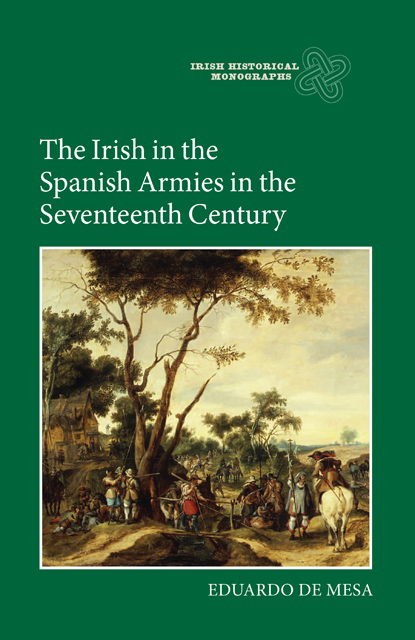4 - An Urgent Need of Soldiers for Spain
Published online by Cambridge University Press: 23 February 2023
Summary
The emergence of different battlefronts in which the Spanish monarchy was involved from 1630 onwards strained Spain’s military resources. There was an urgent need for men as the population of Castile, the main pool of recruitment in Spain itself, was insufficient. For that reason, the Council of War tried several times to levy Irish troops in massive numbers on the proposals of Irish entrepreneurs. The wars of the seventeenth century were managed to a high degree by military entrepreneurs, and Irish officers were not strangers to this phenomenon. The objective was to recruit enough soldiers to raise Irish Tercios for the Armada del Mar Océano as the defence of Spanish America and the Atlantic routes were the main concerns of the Spanish Navy. In addition, after the French declaration of war in 1635, the need for manpower and military resources became ever more pressing. The means for levying troops for Tercios for Spain was overseen and supervised by the Council of War, which was entrusted with the task of dealing with the military affairs of the Peninsula, the coast of North Africa and the different armadas and their expeditions.
The levy of the count of Desmond
In 1630 the count of Desmond presented a proposition to the Council of War. In the proposal he offered to recruit, under the system of contract or asiento, an Irish Tercio of two thousand men from the veteran Irish soldiers who were fighting under French colours, many of whom were from his ancestors’ former Irish patrimony, confiscated by the English after 1583. He demanded that he be appointed maestre de campo.
The Councils of State and of War met jointly to debate the proposition. Desmond would not be appointed as maestre de campo until the unit was at full strength. The most important concern was his plan to raise the troops. On 30 May 1630 Juan de Velasco, protector of the Irish in the Council of War, interviewed Desmond. First, the count claimed that the Irish always wanted a very powerful Spain and desired to unite with her. He maintained that they did not want to serve under any flag other than the Spanish.
- Type
- Chapter
- Information
- The Irish in the Spanish Armies in the Seventeenth Century , pp. 111 - 136Publisher: Boydell & BrewerPrint publication year: 2014



